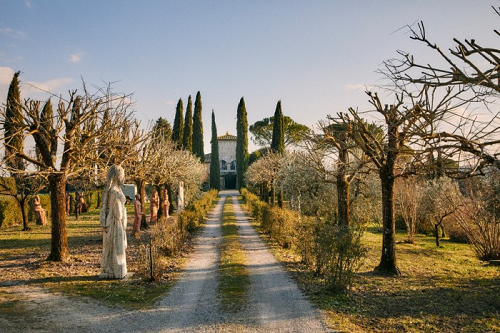Cosima Spender talks up Bocelli and Tuscany, at TIFF
TORONTO – Following her World Premier of Andrea Bocelli: Because I Believe, Director Cosima Spender spoke with Corriere Canadese to discuss of one of this year’s hottest tickets at TIFF. This is part two of their discussion (part one is here).
Did you feel the pressure of making a film about a global artist?
I tried not to change my approach. They did trust me and actually Veronica was instrumental. The fact that I said I’m going to come every month for three or four days or whatever your schedule allows me to do – and I wasn’t going to rush it – I think that always shows a subject of a film that you are committed to telling that story. Andrea’s household is a household where music is alive. He walks down the stairs and he breaks out into an aria and starts singing at any given moment and the crew were extremely honoured. And my crew was Roman. They’re usually a lot louder and love their espressos and schiacciata. But they were just so in awe because it was an honour to be in a room when Andrea’s just warming up his voice and singing an aria in a domestic space. And you can feel the power of his voice. He’s singing and you’re one metre away and you feel the voice hitting you, we were all quite blown away by that, by the experience.
Andrea Bocelli is very proud of his Tuscan roots. Does your Tuscan heritage inform your work, life?
Oh completely, you know I’m very lucky because my parents are not Italian but they moved to rural Tuscany in 1968. And this film was a bit of an ode to the old Tuscany. When I grew up in Tuscany there were still traces of an old agricultural rural society. With globalization and industrialization it’s changed, along with the rest of the world. And of course, the increase of tourism has affected the whole of Italy. And so the film gave me the opportunity to remember the old Tuscany of my childhood. When my parents arrived they still were using oxen to plough the fields. I still grew up very much in the village and playing with people in the village, so I could understand the context of Andrea’s childhood.
Being Tuscan-born do you feel a sense of obligation as an artist, to honour the region’s profound contribution to the arts?
You’re talking about the weight of the past, the weight of the past for me comes much more from my family because both my grandfathers are very important artists, my paternal grandfather is the poet Stephen Spender and my maternal grandfather was the abstract expressionist painter Arshile Gorky. So if you’re talking about weight of the past, I don’t really get it from [Tuscan history]. I feel at home in Tuscany and when I see a Duccio or Lorenzetti, I feel, I recognize the world they’re depicting because it’s still there when you’re going through the landscape. So I feel connected to the past, but the obligation and the sense of obligation of trying your best and expressing yourself through making things, I get that from my family more than [someone like] Dante Alighieri.
Is there a historical figure, a movement or an event in Italy that you would’ve liked to document while it was happening?
Renaissance Florence. I also wouldn’t mind seeing Siena in 1260, which was the moment of glory when they managed to beat the Florentines with the Battle of Montaperti. I’d be curious to see that. There’s many moments, I wouldn’t mind seeing Leonardo at work.
Photo of Veronica Berti, Andrea Bocelli and Cosima Spender by Geoff Robins; photo of Cosima’s childhood home in Tuscany by Stefan Giftthaler
Massimo Volpe is a filmmaker and freelance writer from Toronto: he writes reviews of Italian films/content on Netflix





